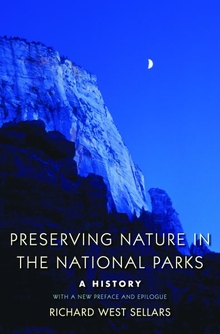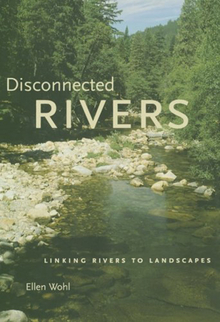Preserving Nature in the National Parks
WARNING
You are viewing an older version of the Yalebooks website. Please visit out new website with more updated information and a better user experience: https://www.yalebooks.com
A History; With a New Preface and Epilogue
Richard Sellars
This book traces the epic clash of values between traditional scenery-and-tourism management and emerging ecological concepts in the national parks, America’s most treasured landscapes. It spans the period from the creation of Yellowstone National Park in 1872 to near the present, analyzing the management of fires, predators, elk, bear, and other natural phenomena in parks such as Yellowstone, Yosemite, Grand Canyon, and Great Smoky Mountains.
Based largely on original documents never before researched, this is the most thorough history of the national parks ever written. Focusing on the decades after the National Park Service was established in 1916, the author reveals the dynamics of policy formulation and change, as landscape architects, foresters, wildlife biologists, and other Park Service professionals contended for dominance and shaped the attitudes and culture of the Service. The book provides a fresh look at the national parks and an analysis of why the Service has not responded in full faith to the environmental concerns of recent times.
Richard West Sellars, a historian with the National Park Service, has become uniquely familiar with the history, culture, and dynamics of the Service—including its biases, internal alliances and rivalries, self-image, folklore, and rhetoric. The book will prove indispensable for environmental and governmental specialists and for general readers seeking an in-depth analysis of one of America’s most admired federal bureaus.
Based largely on original documents never before researched, this is the most thorough history of the national parks ever written. Focusing on the decades after the National Park Service was established in 1916, the author reveals the dynamics of policy formulation and change, as landscape architects, foresters, wildlife biologists, and other Park Service professionals contended for dominance and shaped the attitudes and culture of the Service. The book provides a fresh look at the national parks and an analysis of why the Service has not responded in full faith to the environmental concerns of recent times.
Richard West Sellars, a historian with the National Park Service, has become uniquely familiar with the history, culture, and dynamics of the Service—including its biases, internal alliances and rivalries, self-image, folklore, and rhetoric. The book will prove indispensable for environmental and governmental specialists and for general readers seeking an in-depth analysis of one of America’s most admired federal bureaus.
Richard W. Sellars is a historian with the National Park Service, Santa Fe, New Mexico.
ISBN: 9780300154146
Publication Date: October 1, 2009
Publication Date: October 1, 2009
440 pages, 6 1/8 x 9 1/4
25 b/w in 16-page gallery
25 b/w in 16-page gallery








